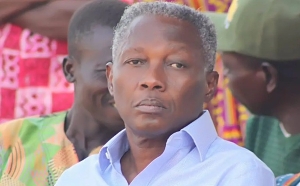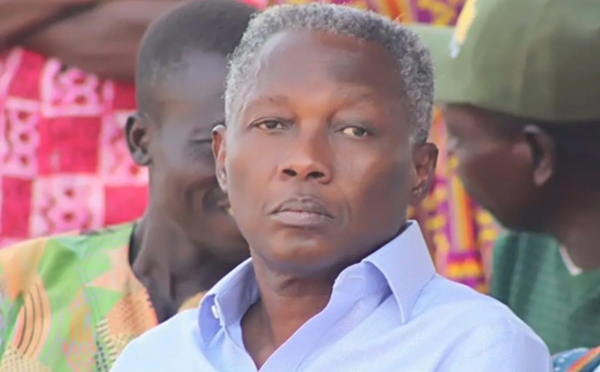 Eric Johnson was stabbed to death by unknown assailants at his home on February 11, 2024
Eric Johnson was stabbed to death by unknown assailants at his home on February 11, 2024
Serious doubts are clouding the credibility of police investigations into the gruesome murder of Eric Johnson, the Chief Executive Officer of Royal Cosy Hotel Limited, popularly known as Jirapa Dubai, following revelations about questionable forensic practices by the police.
Central to the controversy is the decision by the prosecution to rely on forensic analysis conducted outside the official Police Forensic Laboratory.
Instead, the analysis was carried out by a retired police officer, Superintendent Isaac Okrah, under a privately unknown entity, “Forensic Yard.” This move has sparked concerns about the integrity, legality, and reliability of the forensic evidence being used in the high-profile case.
The first accused, Elisha Mahama Akpanyichie, in his witness statement to the High Court in Wa, strongly contested the credibility of the forensic findings.
He argued that the failure of the police to utilise their own accredited forensic laboratory, which has the necessary facilities to analyse fingerprints and footprints, casts serious doubt on the prosecution’s case.
Supt/Rtd Okrah, the prosecution’s forensic witness, admitted under cross-examination that the Police Forensic Laboratory indeed has the capacity to conduct such analyses.
However, he could not provide a satisfactory explanation to the court as to why he performed the forensic examination privately rather than through the formal police system.
“The prosecution did not produce any evidence to show that ‘Forensic Yard’ is a legally registered entity under the laws of Ghana,” Elisha pointed out. “They also failed to establish that PW7 (Supt./Rtd. Okrah) is duly authorised to conduct forensic analysis in his private capacity after retirement.”
The heart of the forensic controversy revolves around a footprint allegedly found in a pool of blood at the crime scene, which the prosecution claims belongs to the first accused. Elisha, however, has rejected this assertion as “palpably false.”
“I am not a fool to commit such a heinous crime barefoot,” Elisha told the court. He further questioned the logic behind the police theory, noting that the evidence of the prosecution’s own cybersecurity expert (PW9) placed him at his residence in Akoro, 4.2 kilometres away from the hotel, on the night of the murder.
“If the Court and the jury are to believe PW7, then I supposedly walked barefoot for 4.2 kilometres from Akoro to the hotel, scaled an electrified fence barefoot, and somehow managed to leave a footprint in the blood without anyone seeing me,” Elisha said, highlighting the implausibility of the narrative.
Elisha further pointed out, “PW5 tendered in evidence without objection the sandals he testified I wore on that day when I left for Takoradi at dawn. These sandals, among other items tendered by PW5, were recovered in my room in Takoradi where my mother lives.”
Some members of the public are wondering why the accused would remove his sandals when he entered the deceased’s room to kill him, hence leaving a trace of his footprint, according to the police’s account, and after committing the crime decided to put on his sandals again.
He also criticised the forensic evidence for failing to explain how he supposedly gained access to the suite of the deceased. “The prosecution has not shown how I obtained the key to the deceased’s room. There is no evidence of forced entry. Even their own witnesses confirmed that I was not among the officers in charge of keys at the hotel,” Elisha stated.
The handling of the forensic analysis in this case has drawn attention to broader concerns about investigative standards and procedures within the Ghana Police Service. Legal experts and observers have questioned why a private forensic examination would be deemed more credible than tests performed by the police’s own certified forensic laboratory.
Additionally, the prosecution did not present documentation proving the legal standing of “Forensic Yard” or the accreditation of Supt./Rtd. Okrah’s forensic work, a gap that defense lawyers argue undermines the admissibility and credibility of the evidence.
The controversy over the forensic process is the latest twist in a case that has captivated national attention. The brutal killing of Mr. Eric Johnson in his Presidential Villa suite at Jirapa Dubai sent shockwaves through the Upper West Region and the hospitality industry.
As the trial continues, the defense maintains that the case against Elisha is a total frame-up, highlighting inconsistencies in the testimonies of prosecution witnesses, conflicting accounts regarding access to the deceased’s suite, and now, the questionable forensic practices employed.
The outcome of this case could have significant implications, not only for the accused but also for the integrity of forensic investigations in Ghana’s criminal justice system.


